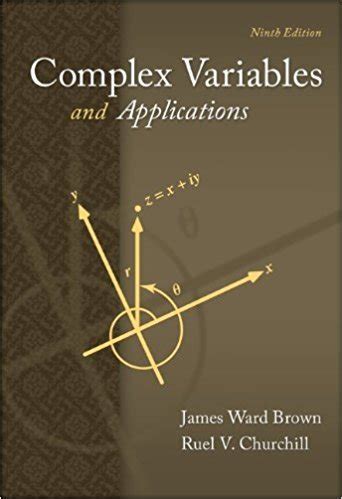Complex variables and applications are an essential part of mathematics, particularly in calculus, differential equations, and mathematical physics. Mastering complex variables is crucial for solving problems in these areas. In this article, we will discuss 7 ways to master complex variables and applications.
Understanding the Basics
To master complex variables and applications, it is essential to understand the basics. This includes the definition of complex numbers, their properties, and operations. Complex numbers are numbers that can be expressed in the form a + bi, where a and b are real numbers, and i is the imaginary unit, which satisfies i^2 = -1.

Some key properties of complex numbers include:
- The conjugate of a complex number a + bi is a - bi.
- The modulus of a complex number a + bi is √(a^2 + b^2).
- The argument of a complex number a + bi is the angle θ between the positive real axis and the line joining the origin to the point (a, b) in the complex plane.
Learning the Algebra of Complex Numbers
Once you understand the basics, it's essential to learn the algebra of complex numbers. This includes operations such as addition, subtraction, multiplication, and division of complex numbers.

Some key results in the algebra of complex numbers include:
- The commutative and associative laws for addition and multiplication.
- The distributive law for multiplication over addition.
- The existence of additive and multiplicative identities.
- The existence of additive and multiplicative inverses.
Mastering Functions of Complex Variables
Functions of complex variables are an essential part of complex analysis. A function f(z) of a complex variable z is a rule that assigns to each complex number z a unique complex number f(z).

Some key concepts in functions of complex variables include:
- Analyticity: A function f(z) is analytic at a point z0 if it can be expanded in a power series in z - z0.
- Continuity: A function f(z) is continuous at a point z0 if it is defined and finite at z0 and if the limit of f(z) as z approaches z0 exists and equals f(z0).
- Differentiability: A function f(z) is differentiable at a point z0 if the limit of [f(z) - f(z0)]/(z - z0) as z approaches z0 exists.
Understanding Cauchy-Riemann Equations
The Cauchy-Riemann equations are a pair of equations that a function f(z) must satisfy if it is to be analytic. The equations are:
∂u/∂x = ∂v/∂y ∂u/∂y = -∂v/∂x
where u(x, y) and v(x, y) are the real and imaginary parts of f(z), respectively.

Learning About Singularities
Singularities are points where a function f(z) is not analytic. There are several types of singularities, including:
- Isolated singularities: A point z0 is an isolated singularity of f(z) if there is a neighborhood of z0 in which f(z) is analytic except at z0.
- Essential singularities: A point z0 is an essential singularity of f(z) if there is no neighborhood of z0 in which f(z) is analytic except at z0.
- Removable singularities: A point z0 is a removable singularity of f(z) if there is a neighborhood of z0 in which f(z) is analytic except at z0 and if the limit of f(z) as z approaches z0 exists.

Mastering Contour Integrals
Contour integrals are integrals of the form ∫f(z)dz, where f(z) is a function of a complex variable z and the integral is taken over a curve in the complex plane.

Some key results in contour integrals include:
- Cauchy's integral theorem: If f(z) is analytic in a domain D, then the integral of f(z) over a closed curve in D is zero.
- Cauchy's integral formula: If f(z) is analytic in a domain D and if z0 is a point in D, then the value of f(z0) can be expressed as an integral over a curve in D.
Learning About Applications
Complex variables and applications have numerous applications in physics, engineering, and other fields. Some examples include:
- Electrical engineering: Complex variables are used to analyze AC circuits and filters.
- Signal processing: Complex variables are used to analyze signals and filters.
- Quantum mechanics: Complex variables are used to describe the behavior of particles at the atomic and subatomic level.

Gallery of Complex Variables and Applications






FAQs
What are complex variables?
Complex variables are numbers that can be expressed in the form a + bi, where a and b are real numbers, and i is the imaginary unit, which satisfies i^2 = -1.
What is the Cauchy-Riemann equation?
The Cauchy-Riemann equation is a pair of equations that a function f(z) must satisfy if it is to be analytic. The equations are:
∂u/∂x = ∂v/∂y ∂u/∂y = -∂v/∂x
What are singularities?
Singularities are points where a function f(z) is not analytic. There are several types of singularities, including isolated singularities, essential singularities, and removable singularities.
What is a contour integral?
A contour integral is an integral of the form ∫f(z)dz, where f(z) is a function of a complex variable z and the integral is taken over a curve in the complex plane.
We hope this article has provided you with a comprehensive guide to mastering complex variables and applications. With practice and persistence, you can become proficient in this area and apply it to various fields.
